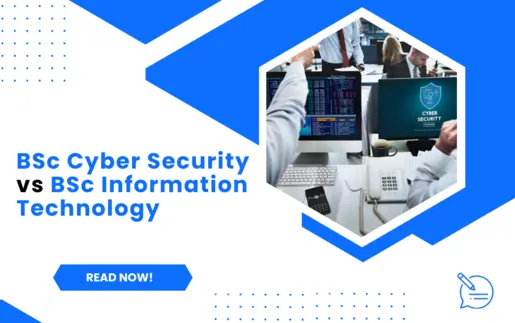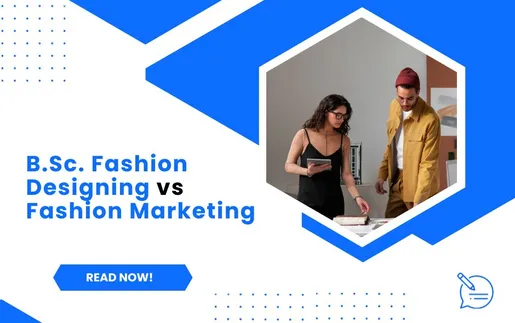Unveiling the Digital Frontier: Navigating Success with a B.Sc IT Course
The B.Sc IT course teaches skills related to storing, processing, securing, and managing information. This degree primarily focuses on software, databases, and networking. The B.Sc in IT course is awarded for completing studies in software development, software testing, and web design. The B.Sc in Information Technology colleges enables its students to perform technology tasks related to processing, storing, and communicating information between computer systems. A B.Sc IT course is essential for students who want to build careers in programming, networking, and database management.

All About B.Sc IT course
The full B.Sc IT course is a Bachelor of Science in Information Technology. It is a three-year bachelor's degree program. This course is offered full-time at the best B.Sc Information Technology colleges in Punjab. CGC is one of the best B.Sc in Information Technology colleges. You can take admission after completing class 12. This course is the best option for students who want to build their careers in software development, database management, and web design.
Why pursue a B.Sc in IT?
Admission to top B.Sc Information Technology colleges in Chandigarh is the right option for students passionate about computer programming, IT systems, and database management. Students with a B.SC IT degree can start their careers in software firms or the Information technology department across various industries. You can also specialize in data analytics, cloud computing, and database management. You can even start working in organizations dependent on the IT industry, such as pharmacy, healthcare, space research, ed-tech, etc.
Who can pursue a B.Sc in IT course?
After admission to the best B.Sc Information Technology colleges in Punjab, you must be urged to learn every concept about information technology. Candidates with analytical, creative, and problem-solving skills can pursue a B.Sc IT course. You must be able to take quick action to solve problems related to hardware and software compliance. You must also have the passion and zeal to build and work on algorithms.
What is the scope of B.Sc IT?
After completing the B.Sc IT course, you can enter various fields:
- Education
- Pharmaceuticals
- Banking and Financial Sector
- Automobile Industry
- Healthcare Industry
- Consumer Services
- Telecom Sector
- Web Design
- Gaming and Animation
You can also start your career in the IT sector and handle customer complaints. You can provide technical assistance to complainants, solve network issues, and provide consulting on IT and software issues.
B.Sc IT Course Eligibility
The candidate must have completed 10+2 with a minimum aggregate of 50% marks from a recognized board. You may be required to appear for entrance exams like CUET and sit for the GD/PI round.
B.Sc IT Syllabus
The top B.Sc Information Technology colleges in Chandigarh cover a wide range of syllabus topics. The core subjects taught are:
Semester 1
- Computer and Information Technology [Core Courses]
- Communication Skills - I [Communication Skills]
- Programming in C [Core Courses]
- Foreign Business Language
- Digital Logic and Circuit Design [Allied Courses]
- Open Elective Courses
- Environmental Studies [Allied Courses]
- Outdoor Activity-Based Courses
Semester 2
- Sociology of Change and Development [Human Social Sciences & Management Courses]
- Communication Skills - II [Communication Skills]
- Data Structures Using C [Core Courses]
- Foreign Business Language
- Operating System Concepts [Core Courses]
- Open Elective Courses
- Network Basics [Allied Courses]
- Outdoor Activity-Based Courses
Semester 3
- Term Paper [Non-Teaching Credit Courses]
- Individual Excellence and Social Dynamics [Behavioural Science]
- Computer Architecture and Assembly Language [Core Courses]
- Foreign Business Language
- Introduction to Database Management Systems [Core Courses]
- Open Elective Courses
- Object-Oriented Programming Using Java [Core Courses]
- Outdoor Activity-Based Courses
- Discrete Mathematics for IT [Allied Courses]
Semester 4
- Computer Communications and Networking [Specialisation Elective Courses]
- Introduction to Open Source Technologies-Php, Mysql [Core Courses]
- Cyber and Information Security [Specialisation Elective Courses]
- Software Engineering and Modeling [Core Courses]
- Fundamentals of Routing Protocols [Specialisation Elective Courses]
- Creativity for Team Excellence [Behavioural Science]
- Internet of Things [Specialisation Elective Courses]
- Open Elective Courses
- Introduction to Artificial Intelligence [Specialisation Elective Courses]
- Outdoor Activity-Based Courses
Semester 5
- E-governance [Specialisation Elective Courses]
- Java Programming [Core Courses]
- Fundamental of Cloud Computing & Enterprise [Specialisation Elective Courses]
- Unix Operating System and Shell Programming [Core Courses]
- Fundamentals of Digital Marketing [Specialisation Elective Courses]
- Professional Ethics and Social Responsibility [Professional Ethics]
- Image Processing [Specialisation Elective Courses]
- Foreign Business Language
- Introduction to Enterprise Resource Planning [Specialisation Elective Courses]
- Open Elective Courses
- IT Project Management [Specialisation Elective Courses]
- Outdoor Activity-Based Courses
- Summer Internship - I [Non-Teaching Credit Courses]
Semester 6
- Animation and Gaming [Specialisation Elective Courses]
- Visual .Net Technologies [Specialisation Elective Courses]
- Fundamentals of E-commerce [Specialisation Elective Courses]
- Web Technologies and Applications [Specialisation Elective Courses]
- Fundamentals of Network Security [Specialisation Elective Courses]
- Major Project [Non-Teaching Credit Courses]
- Introduction to Mobile Computing [Specialisation Elective Courses]
- Data Warehousing and Mining [Core Courses]
- Matlab Programming [Specialisation Elective Courses]
- Social Communication [Communication Skills]
- Multimedia Technologies [Specialisation Elective Courses]
- Stress and Coping Strategies [Behavioural Science]
- Object-Oriented, Analysis and Design [Specialisation Elective Courses]
- Foreign Business Language
- Python Programming [Specialisation Elective Courses]
- Open Elective Courses
- Software Testing Techniques [Specialisation Elective Courses]
- Outdoor Activity-Based Courses
Career Options after B.Sc in IT course
The career scope of B.Sc IT is vast. Here are a few career opportunities you can pursue after B.Sc IT.
Graphic Designer
A graphic designer is a professional who makes graphics, graphic arts, or visuals to create a work of art. Graphic designers are visual communicators who produce graphic ideas using computer programs. They use both actual and virtual forms of communication, such as pictures, text, and graphics, to promote, instruct, and enlighten the audience.
Software Developer
A software developer helps with system maintenance and upgrades to ensure that any security risks are handled, and that the system is compatible with new databases. They create the underlying technologies that govern networks, while others develop programs that enable people to do specific activities on a computer or mobile device.
Computer Hardware Engineer
A computer hardware engineer assesses client requirements and proposes acceptable hardware. They oversee high-priority media material, technical examination, and investigation. A computer hardware engineer analyzes, develops, manufactures, and tests computer systems and equipment using integrated circuits, microprocessors, storage systems, networking, and adapters.
Network Technician
A network technician is someone who administers the company's network systems. They supervise, troubleshoot, and monitor LAN and WAN use and configure and assist an institution's internet, intranets, and extranets. A network technician also employs antivirus software to protect a computer network from cyber-attacks and to keep it up to date regularly.
Admissions Open at CGC Jhanjeri
Admissions open for B.Sc IT at CGC Jhanjeri. CGC Jhaneri is one of the top B.Sc Information Technology colleges in Chandigarh. The college is well-known for its advanced infrastructure and experienced faculty. The placement cell at CGC Jhanjeri offers a wide range of services to assist students in their job search journey. They collaborate with industry experts to provide insights into current job trends and industry expectations.
Frequently Asked Questions
Is B.Sc IT superior to B.Tech IT?
A variety of things determine this. B.Sc IT is superior in education since it is a three-year program compared to B.Tech IT, a four-year program. This implies that if you join the job immediately after finishing your studies, you will earn more than a B.Tech. student in their fourth year. The B.Sc IT curriculum is also tailored to industrial needs. The drawback is that a B.Tech. IT fresher would be paid more than a B.Sc IT newcomer.
Is it simple to get a B.Sc in IT?
Academically, a B.Sc is more straightforward, mainly since it is one year shorter than a B.Tech. You might become a teacher if you get a Master's degree. There are several career opportunities available.



















